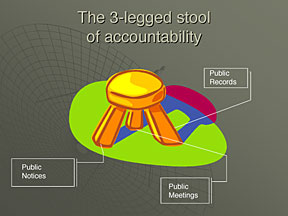Newspapers in two states battle over right to publish notices
Public Notice Resource Center & NNA
Apr 1, 2023
Most states require newspapers to have paying subscribers to publish notices, but at least a few grant that authority to free-distribution papers, as well. Those requirements don’t change very often, which is why it’s so unusual to have two states considering legislation this year that would allow free papers to publish notices.
The newspapers supporting the measures in both states were founded by entrepreneurs in communities where the paid-circulation newspapers have experienced multiple rounds of layoffs and cutbacks in recent years. Taking the other side of the debate are the states’ press associations, both of which oppose the bills.
The legislation in South Dakota was backed by Joe Sneve and Jonathan Ellis, who started The Dakota Scout last fall. The former reporters for Gannett’s Sioux Falls-based Argus Leader describe their new paper as an “independent and locally owned political newspaper focusing on state and local politics in the state Capitol and Sioux Falls.” According to Sneve, the paper has a weekly print run of 5,000 copies distributed in 200 locations throughout the Sioux Falls areas, including coffee shops, retail outlets and Hy-Vee grocery stores.
The original measure supported by the startup expanded the definition of “legal newspaper” to incorporate publications with at least 200 paid online subscribers and “an associated (weekly) print edition” with a minimum circulation of 500 copies. Newspapers meeting those criteria would qualify to publish notices “regardless of whether the print edition is made available to the public for a paid subscription or for free.”
During a Feb. 1 committee hearing, the South Dakota Newspaper Association (SDNA) argued the bill undermines key principles in the law defining legal newspapers, including authenticated circulation, local presence and demonstrated publishing viability. The committee voted to kill the legislation by a 4-3 margin.
Following that setback, The Dakota Scout’s founders formed an independent press association, hired a lobbyist, and moved the fight to new terrain by hoghousing a zombie bill and replacing its original content with new language amending the definition of legal newspapers. Like their previous measure, the hoghoused bill allowed free-distribution papers to publish notices, but it increased the earlier bill’s minimums to 500 paid online subscribers and 750 print copies. It also required the paper to be locally owned, work out of a local office and provide governing bodies with a circulation audit, upon request.
That second bill was turned back on Feb. 21 on a 5-4 committee vote. “Much of the discussion in favor of the bill was aimed at criticism of the Sioux Falls Argus Leader, Aberdeen American News and Watertown Public Opinion,” reported the Mitchell Republic. “The three newspapers are all owned by Gannett, a national chain of newspapers. Gannett’s South Dakota publications have sharply cut their staffs and news–gathering capabilities.”
The Dakota Scout’s Sneve tells Public Notice Monthly that he and co-founder Ellis started the paper to fill the need for robust local reporting that had grown more acute as the Argus Leader cut staff and resources. “When we launched, we had local officials approach us about getting the legals,” he says.
Sneve emphasizes that The Dakota Scout supports the preservation of laws requiring newspaper notice. “We have bent over backwards to protect print — we’re newspaper people,” he says. “We believe there should always be a printed record of notices so they’re not subject to revision. Philosophically, we believe notices should be published in print by a third-party independent from the government.”
Sneve says the press association he and Ellis started now includes eight news organizations — three publish free-distribution print editions (one hasn’t launched yet) and five are online-only. The group eventually plans to work on issues on which are aligned with SDNA, such as open records and open meetings. According to Sneve, a third bill defeated by SDNA last month that would have repealed the one-year publishing requirement for legal newspapers was pursued by another member of the new association.
With only one week left in South Dakota’s legislative session, the state law designating which papers qualify to publish notices appears to be settled for now. But SDNA Executive Director David Bordewyk says his organization “left this session with a gentleman’s promise to legislators and others to work on this issue in the interim and propose a legislative solution next year.”
“We recognize the trends and changes occurring in our state’s news media ecosystem, and we are committed to making sure our state’s laws defining a legal newspaper properly reflect those trends,” says Bordewyk.
The bill in New Jersey that would allow free-distribution papers to publish notices was also initiated by an entrepreneur who started a paper to fill a hole in local news coverage. Doug Melegari launched the weekly Pine Barrens Tribune in 2016 in a rural area of South Jersey. He tells us the Tribune circulates 7,000 copies in grocery stores, convenience stores, restaurants and other retail outlets, mostly in boroughs and townships in the central and southeastern regions of Burlington County.
Melegari says most notices in the county — which covers a large swath of the state abutting both Trenton and Philadelphia, and includes over 40 separate municipalities — are published by Gannett’s Burlington County Times. He claims the paper no longer circulates widely in his region and its coverage of the area has diminished as its editorial resources have dwindled.
“We’re usually the only newspaper that covers local council meetings,” he says.
Alden Global Capital also owned a paid-circulation newspaper called the Central Record that once had a significant presence in Burlington County. After a long decline, it seems to have been quietly shuttered, although Alden still appears to be running some notices for municipalities in Burlington County on its AllAroundPhilly Marketplace website.
The bill Melegari is backing was reported favorably out of a committee at a Feb. 9 hearing. Although the proposal is designed to allow free-distribution papers to publish notices, in its current form, it wouldn’t do that since it retains the periodical-permit requirement in New Jersey’s public notice statute. With few exceptions, the U.S. Postal Service issues postal permits only to paid-circulation papers. (Melegari says the bill’s sponsor is aware of the problem.)
According to a report of the hearing in the Pine Barrens Tribune, some of the same concerns that arose in South Dakota were on the minds of the state senators who voted 4-0 in favor of the bill.
The committee chairman argued “the weeklies of my area are vital to the communities of the area because local news is no longer covered by our local newspaper.” He blamed “the corporatization of media (which) has actually shrunk the coverage of what is happening” in local communities.
“You want to protect the First Amendment?” asked another committee member. “Then have greater competition, because what has happened now is all of the little guys have been eaten up by the big guys, and we have one editor deciding what news gets printed in the paper. ... I think this bill is important to make sure we protect the First Amendment, in addition to making sure a greater number of people are informed.”
According to the report in Pine Barrens Tribune, the attorney representing the New Jersey Press Association at the hearing argued that public notice should remain exclusively in paid-circulation newspapers because readers tend to devote more time and attention to publications they pay for than to those they can get for free.
Opponents of the bill and members of the committee also raised concerns about the potential for TMC shoppers and “diner placemats” to qualify to publish notices. That suggests they were unaware that the mandate in New Jersey law requiring legal newspapers to contain at least 35% news content would prevent that from transpiring. (Most states that have a news content provision excluding shoppers set it at 25%.)
Although the focus at the Feb. 9 hearing was on print circulation, it’s worth noting that the Burlington County Times appears to publish all of its notices on its website and makes them easy to read. The Times also includes a prominent home-page index link to the notices that helps to ensure its readers know they are there and can easily find them. The same can be said for the Argus Leader in Sioux Falls, also a Gannett property.










